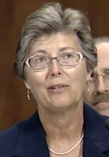© 2017 The Texas Lawbook.
By Mark Curriden
(June 22) – Dallas-based Valhi’s attempt to sell its radioactive waste disposal operation in West Texas to a competitor violates antitrust laws, a federal judge ruled Wednesday.
U.S. District Judge Sue Robinson of Delaware, in a 52-page opinion that is under seal, decided that the proposal by Utah-based EnergySolutions to purchase Waste Control Specialists for $367 million runs afoul of federal laws designed to protect and promote competitive business practices

The U.S. Department of Justice sued the two companies last November to stop the transaction, claiming that the deal would hurt competition and consumers and would give the newly combined company an unfair monopoly in the world of nuclear and hazardous waste disposal.
DOJ lawyers argued that WCS had options for financial survival other than its sale to EnergySolutions. The government said WCS needed to seek another merger partner or an outside investor or even restructuring under federal bankruptcy protection.
WCS, a company started more than two decades ago by now-deceased Dallas businessman Harold Simmons, is a corporate subsidiary of Dallas-based Valhi. WCS argued that the business was a financial failure and that a sale to Energy Solutions was the only solution available.
EnergySolutions and WCS announced the court decision in separate press releases today. Both expressed disappointment.
“WCS presented overwhelming evidence in favor of allowing the transaction to proceed to closing,” said Baker Botts partner Van Beckwith, who represents WCS and Valhi. “We are very disappointed with the decision.”

“WCS has built the nation’s state-of-the-art facility for low level radioactive waste disposal,” WCS CEO Rod Baltzer said in a written statement. “The acquisition will protect desperately needed American jobs and innovation and ensure the continued operation of this facility, which is needed for the disposal of Class B and C low level radioactive waste.
“The DOJ investigation and litigation has taken over 18 months at great expense to WCS, and WCS must now determine whether to appeal the trial court’s decision and further prolong the process and associated expense,” Baltzer said.
© 2017 The Texas Lawbook. Content of The Texas Lawbook is controlled and protected by specific licensing agreements with our subscribers and under federal copyright laws. Any distribution of this content without the consent of The Texas Lawbook is prohibited.
If you see any inaccuracy in any article in The Texas Lawbook, please contact us. Our goal is content that is 100% true and accurate. Thank you.
